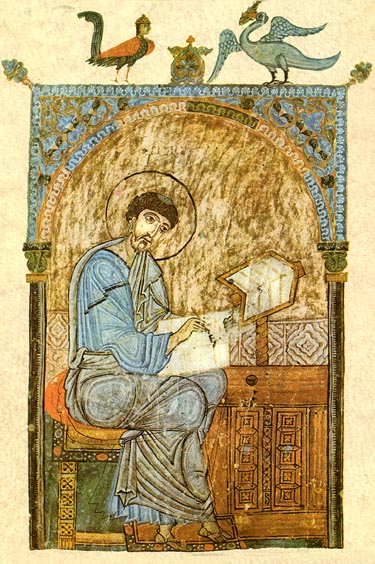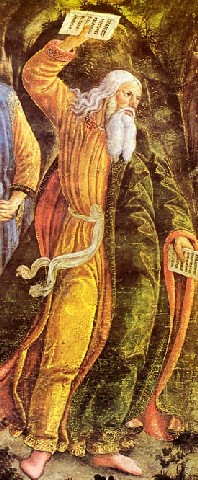 |
The Saint of the Day
St. Isidore of Pelusium, February 4
Prof. Plinio Corrêa de Oliveira
Biographical selection:
St. Isidore was born at Alexandria. As a youth he left the city and became a monk at the Monastery of Lychnos, near Pelusium. He was also ordained, and became abbot of the monstery.

We still have some 2,000 letters of St. Isidore of Pelusium
|
He was highly regarded for his devotion to his religious duties and famous for his correspondence. Still extant are some 2,000 of the 10,000 letters he wrote, filled with pious exhortations and theological instruction. He was a vigorous opponent of Nestorianism and Eutychianism.
This is an excerpt from his letter to Bishop Theon:
"We are equally guilty either when we want to revenge our personal injuries or when we do not rail against the offenses made against God. When the offenses regard us, we should show kindness and mercy, but we should exercise rigor when someone offends God. See how weak we are. We are sensitive about offenses to ourselves to the point of not wishing to forgive our enemies, and we only have kindness regarding those made to God.
"Moses did not act this way. He became indignant with the Israelites when they built the Golden Calf. On that occasion his wrath was much holier than any kindness he could have shown. Elias took a strong stand against the idolaters, John Baptist against Herod, St. Paul against the sorcerer Elimas. They all revenged the offenses made to God. Regarding injuries to their own persons, they readily forgot them.
"Even though God is powerful enough to mete out justice, He wants us to hate sin and to teach this hatred. The saints use to teach this way of zeal as the way of true wisdom."
Comments of Prof. Plinio:
The principle defended by St. Isidore of Pelusium in this letter has several applications we can make.

Moses showed a righteous indignation when the Israelites adored the Golden Calf
|
Regarding forgiveness of injuries I must be very sensitive to the offenses made to God, and therefore also to Our Lady and to the Holy Catholic Church. Offenses to the Holy Church are not only sins against morals, but also are public manifestations of bad doctrine. I must be very sensitive to this. On the other hand, regarding offenses to my own person, I should forgive, forget, and be amiable with my offender.
God deserves everything. But a mere human creature, who is conceived in sin, who sins and then returns to sin after being forgiven, does not deserve that much. Therefore, I should not take offenses against myself too seriously.
I should measure my love for God in this way: If I am very sensitive to injuries made against me, if I easily give way to interior movements of anger and resentment because of my self-love, then I do not love God. On the contrary, if I am calm and understanding in face of injuries made to me, and at the same time I do not tolerate the evil done against the Church, the reputation of Our Lady, and the honor of Our Lord, this is a sign that I love God.
Scriptures says: “For where thy treasure is, there also is thy heart.” (Matt 6:21). We could paraphrase this, saying: “For where your indignation is, there also is your heart.” If I do not become indignant when something or someone is injured, I indicate that I do not love this thing or person. If someone speaks against God and against the Church, I cannot consider this a small matter that does not affect me. If I act in this way, I do not love God.
This is what St. Isidore taught us in his letter. Let us ask him to help us extirpate from our souls the remains of liberalism that prevent us from understanding and being completely consonant with this principle.


  | | Prof. Plinio Corrêa de Oliveira | |
The Saint of the Day features highlights from the lives of saints based on comments made by the late Prof. Plinio Corrêa de Oliveira. Following the example of St. John Bosco who used to make similar talks for the boys of his College, each evening it was Prof. Plinio’s custom to make a short commentary on the lives of the next day’s saint in a meeting for youth in order to encourage them in the practice of virtue and love for the Catholic Church. TIA thought that its readers could profit from these valuable commentaries.
The texts of both the biographical data and the comments come from personal notes taken by Atila S. Guimarães from 1964 to 1995. Given the fact that the source is a personal notebook, it is possible that at times the biographic notes transcribed here will not rigorously follow the original text read by Prof. Plinio. The commentaries have also been adapted and translated for TIA’s site.
|
Saint of the Day | Home | Books | CDs | Search | Contact Us | Donate

© 2002- Tradition in Action, Inc. All Rights Reserved
|
 |
|